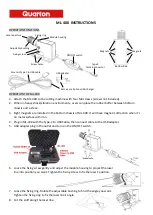
Measurement sample
Viewing
Illumination 2
45º
Illumination 1
Illumination 3
75º
Shade direction
25º
Highlight direction
The CM-512m3 measures colors by illuminating subjects from three
angles simultaneously (25º, 45º and 75º), making it suitable for subjects
such as metallic/pearl coatings used for automotive exteriors or for the
textured materials used for automotive interiors and allowing the
changes in color according to the illumination angle to be measured.
Unlike conventional spectrophotometers, correlation of the measurement
results with visual evaluation of such subjects can be achieved.
The ring-shaped illumination ensures stable
measurement without being affected by the ori-
entation (rotational deviation) of the instrument.
Measurement is stable even for curved sur-
faces, such as automotive components.
Not only flat surfaces but also curved surfaces can be
measured stably with the large measurement area, the
two extension feet and the optional grip attached to the
instrument.
The graph display function enables easy
color judgment even on production sites
without using a personal computer.
Tolerance (allowable range) can be set for each target
data.
Original development
Evaluation equation suitable for measure-
ments of metallic/pearl coating correlates
well with visual evaluation.
With the conventional
∆
E*ab equation, the values in the
highlight direction (25º) become larger and do not corre-
lated well with the results of visual evaluation. With the
CM-512m3, the
∆
E
00
(CIEDE2000) equation is used with
parameters fine-tuned based on proprietary knowhow to
provide measurement data for metallic/pearl coatings
which correlate well with visual evaluation.
Extension feet
Measurement button
Grip
CM-A42
(optional)
Multi-angle method (Ring illumination from three angles / Light reception in one direction)
Illumination: 25º, 45º, 75º
Light reception: 0º
The measurement sample is illuminated from three angles and the reflection in one direction is received. Metallic/pearl colors may result
in great differences in color appearance depending on the observation angle. Like visual evaluation, the multi-angle method obtains
measured data by applying illumination from three different angles. Consequently, it is suitable for the evaluation of metallic/pearl colors.
Measurement Principle
Illuminating/viewing optical system
Illumination is applied in the form of rings at angles of 25º, 45º and 75º away
from the perpendicular to the sample surface. The light reflected in the direction
perpendicular to the sample surface is received.
25º: Corresponds to the highlight direction of visual evaluation
75º: Corresponds to the shade direction of visual evaluation
Pre-flash function
Pre-flash (at 2% of the intensity of full emission) is performed at the beginning of
measurement to determine the optimal intensity for measurement according to
the reflectance of the sample. This function reduces power consumption and im-
proves repeatability when measuring samples with low reflectance.
Applications for texture measurements
Textured materials used for automotive interiors
With the recently popular textured materials that have large
and deep geometrical patterns, it is difficult to obtain color
differences with integrating sphere (d/0) or 45/0 instruments.
The CM-512m3 allows evaluation that correlates well with visual
evaluation by obtaining data at the angles of 25º and 75º.
Applications for coating measurements
Automotive exterior
The portable, handheld design ensures
easy and stable measurement on
production sites.
The instrument can be held easily
and firmly, and measurements can be
taken without being concerned about
its orientation (rotational deviation).
Personal computers and home appliances
Construction materials such as exterior
walls and kitchen panels
Office furniture
Even curved surfaces of car bodies or bumpers
can be measured stably.
PASS/FAIL display
Color difference display
∆
L*
∆
C*
∆
H*
∆
E
00
Vertical
full-scale
value
±
0 line
25º 45º 75º
∆
L*
∆
C*
∆
H*
∆
E
00
display example
Line graph display
Color difference tolerance
setting example:
∆
E
00
=0.5






















